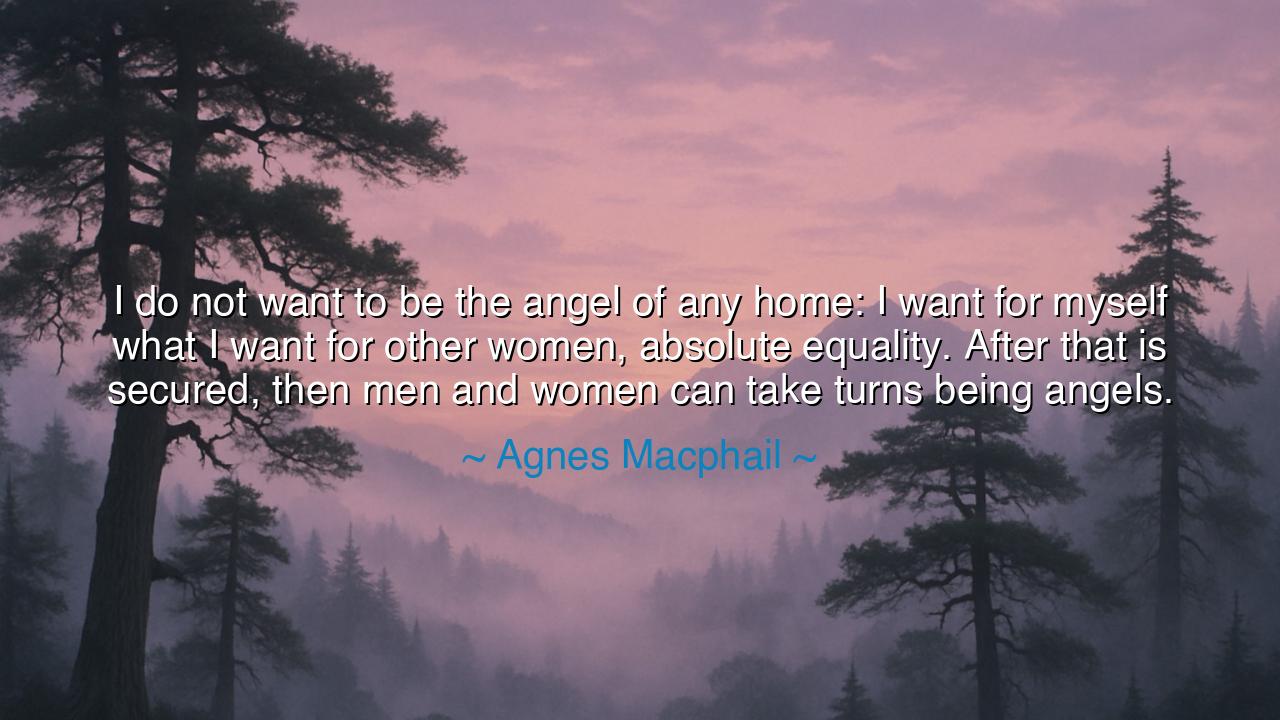
I do not want to be the angel of any home: I want for myself what
I do not want to be the angel of any home: I want for myself what I want for other women, absolute equality. After that is secured, then men and women can take turns being angels.






There are words that burn not with anger, but with the sacred fire of justice — words that do not destroy, but awaken. So it was when Agnes Macphail, the first woman elected to the Canadian Parliament, declared: “I do not want to be the angel of any home: I want for myself what I want for other women, absolute equality. After that is secured, then men and women can take turns being angels.” In these lines, she spoke not only for herself, but for generations of women who had long been caged behind the illusion of virtue — praised for gentleness, yet denied freedom; exalted as symbols, yet denied as equals. Her words are not merely political; they are a cry from the human spirit for balance, for truth, for the restoration of dignity to both woman and man.
When Macphail rejects the title of the “angel of the home,” she is defying a centuries-old myth — one that dressed oppression in the garments of sanctity. In the Victorian age, society revered the “angel in the house” — the ideal woman who lived only for others, whose virtue lay in submission and self-sacrifice. To be an angel was to be invisible, tireless, and voiceless — to labor for love, yet have no name of one’s own. But Macphail saw through this gilded image. She recognized that such angelic perfection was a prison of expectation, chaining women to roles that denied them the full breadth of humanity. She did not want wings bestowed by men’s ideals; she wanted freedom rooted in equality — the right to be human before being holy.
Her demand for “absolute equality” was not a plea for privilege, but for fairness — a radical simplicity that remains revolutionary even today. She saw that equality is not the rejection of difference, but the sharing of burden and honor alike. “After that is secured,” she says, “then men and women can take turns being angels.” In that single line, she transforms her defiance into balance — for she does not despise compassion or care; she simply demands that these virtues no longer be confined to one gender. When equality is achieved, tenderness itself will become mutual; the divine work of nurturing will no longer fall solely on the shoulders of women, but will be shared by all who dwell under the same sky.
History offers us many mirrors for her truth. Consider Hypatia of Alexandria, the philosopher and mathematician of the 5th century, who dared to teach in a world that denied women the right to reason. Hypatia was not content to be a silent angel of any home — she sought wisdom itself, and for that, she was both revered and condemned. Her life was a testament to Macphail’s vision: that women’s greatness does not lie in obedience, but in courage; not in serving from the shadows, but in standing as equals beneath the sun. The fire that consumed Hypatia’s body in Alexandria would, centuries later, become the flame that illuminated Macphail’s resolve.
There is also in Macphail’s words a recognition of the burden men have carried under patriarchy. When she imagines men and women “taking turns being angels,” she envisions a new order of partnership — one where men, too, are freed from the chains of hardness and dominance, allowed to be gentle, nurturing, and kind. True equality liberates both genders, for the system that silences women also wounds men by denying them the fullness of their emotional selves. In this vision, love is no longer duty, but harmony — a shared guardianship of life itself.
Yet the struggle she names is not merely of her century. Even now, in the modern age, many are still told to be “angels” when they should be architects — to care without question, to endure without complaint, to serve without rest. Macphail’s voice reminds us that compassion, to be pure, must be chosen freely, not imposed by expectation. To demand equality is not to destroy the home, but to purify it — to make it a place where all souls stand equal in love and responsibility.
The lesson, then, is timeless and profound: Do not accept virtue that requires your silence. Seek equality first, for without it, kindness becomes servitude and love becomes labor. Let your wings — whether of duty or devotion — be your own to open. Build homes where strength and softness coexist, where every person, regardless of gender, can rise, rest, and serve in turn. For the truest angel is not born of submission, but of freedom shared.
So let the name of Agnes Macphail be remembered among the prophets of justice — not as a rebel against love, but as a restorer of balance. She sought not to abolish care, but to ennoble it; not to destroy the home, but to make it whole. Her words remain a clarion call to the ages: until all stand equal, there can be no heaven in the home. But when equality reigns, then — and only then — may men and women take turns being angels, each lifting the other, wing to wing, toward the greater good.






AAdministratorAdministrator
Welcome, honored guests. Please leave a comment, we will respond soon